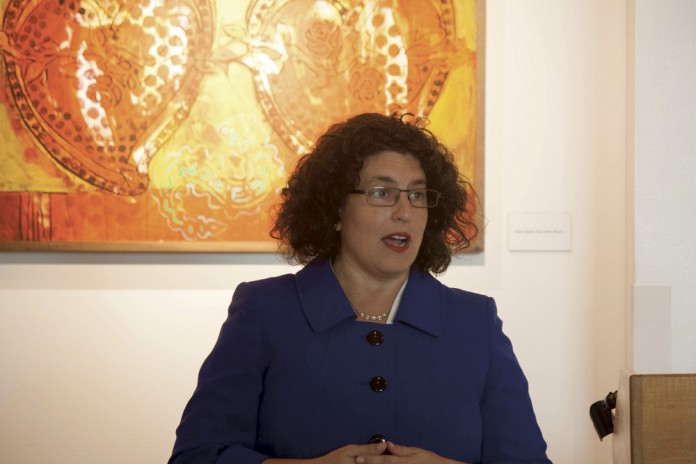Khaya Bhatia
The University of California, Santa Barbara division of the Southern Poverty Law Center hosted a discussion and question-and-answer session last Thursday with Santa Barbara Mayor Helene Schneider, a candidate to replace Rep. Lois Capps in Congress. The April 14 discussion at the MultiCultural Center focused on voting rights but also delved into her background in politics and experience as a woman in office.
Schneider said that making social change as a woman in office requires nothing less than being a leader. She lives by the philosophy, “Show up, speak up, rise up and act up,” four phrases that she says allow her to see a problem, envision a solution and bring people together for the cause of social justice.
When she first became mayor in 2010, Schneider focused many of her efforts on helping to house the homeless and mentally ill. She was a main impetus to the city’s installation of a downtown detoxification center, run by the Council on Alcohol and Drug Abuse.
Before entering public office — first as a city councilmember from 2003 to 2010 — Schneider served for 11 years as human resources director at Planned Parenthood of Santa Barbara, Ventura and San Luis Obispo counties. She first moved to Santa Barbara in 1992, when she became involved with the reelection campaign of then-Assemblymember Jack O’Connell.
If elected to Congress, one of Schneider’s goals will be to implement a more uniform voter registration process throughout the United States. As an example, she offered a comparison of registration processes in California and Texas. In California, proof of legal U.S. residence — such as a driver’s license or state identification card — can be substituted for an interview in some circumstances, whereas Texas strictly requires such proof.
Schneider proposes additional changes that include voting opportunities for ex-convicts who have completed parole and ballots mailed to registered voters one month ahead of time to increase voter turnout.
She also emphasized that voting is not only for national elections, and recommended shifting city elections to even years. Schneider encouraged students to get connected and talk to others about propositions on the local ballots because decisions on resources like public parks, libraries and water funding — to name a few — are all influenced by the local government and each citizen’s ballot vote.
“When you get involved and talk to people about the local ballot, then you see connections about what happens here locally, how that affects state and federal laws and how we can all come together as a community to rise up and be leaders, to make positive social change,” she said. “But it really all comes down to the very simple act of registering and voting.”
As for Schneider’s biggest congressional plans, she said she hopes to shy away from “yes or no” propositions and would rather make change by moving conversations forward. She wants to tackle on a range of national issues, including reproductive health care, pay equity, gun control, student debt, LGBT+ discrimination and energy savings.
Fourth-year political science major Arpan Singh asked if Schneider had any advice for women with future leadership aspirations. In response, she encouraged women to follow their passions, because even if they fail, she said the experience itself is worth it.
“Women tend to think they need to know more than they actually do,” Schneider said. “Don’t let the perfect get in the way of the good.”












Comments are closed.